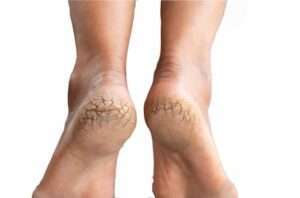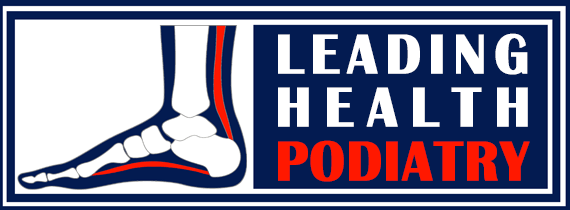Cracked Heels
What Are Cracked Heels?
Cracked heels occur when dry, thick skin on the heels of the feet splits or cracks. Sometimes, these cracks affect only the outer skin layer, causing minimal discomfort, while other times, cracks penetrate deeper, causing pain, bleeding, and the risk of infection. Cracked heels are often accompanied by thickened calluses, which can worsen the cracks.

What Causes Cracked Heels?
Cracked heels are primarily caused by dry, hardened skin around the heel area. This occurs when the skin loses moisture, becoming less flexible and prone to cracking. Common causes include:
- Long periods of standing or walking
- Wearing unsupportive footwear (e.g., thongs, open-backed sandals)
- Biomechanical issues placing pressure on the heels
- Hot, prolonged showers
- Increased weight
- Medical conditions, such as diabetes
In warmer months, cracked heels are more common due to open-back shoes and prolonged barefoot exposure.
Symptoms of Cracked Heels
Cracked heels typically present with visible splits in the skin, pain while standing, discomfort from deep cracks, and itching. In severe cases, bleeding and infection can occur if the cracks reach healthy tissue.
How Podiatrists Can Help with Cracked Heels
A podiatrist plays a crucial role in diagnosing and treating cracked heels. At Leading Health Podiatry, our team is skilled in safely removing calluses and dry skin, assessing for infections, and treating underlying causes like biomechanical factors. We’ll also develop a personalised plan to prevent the recurrence of cracked heels.
Treatment Options for Cracked Heels
Treatment for cracked heels involves a combination of steps:
- Callus Removal: Safely reducing hard, dry skin to prevent deep cracks.
- Infection Treatment: If necessary, we’ll address any underlying infections and use dressings to support healing.
- Proactive Care: Developing strategies to avoid recurrence, including custom footwear advice and skin moisturising techniques.
Top Tips to Prevent Cracked Heels
- Moisturise Daily: Use a urea-based cream to keep skin supple and soft.
- Proper Footwear: Avoid wearing thongs or going barefoot for long periods. Opt for supportive shoes with enclosed heels.
- Regular Podiatrist Check-ups: Have calluses safely removed before they become problematic.
- Exercise & Hydration: Promote circulation and keep your skin hydrated by staying active and drinking plenty of water.
Cracked Heels FAQ
How Can I Fix Cracked Heels? The best way to fix cracked heels is by consulting a podiatrist who will assess your heels, remove hard skin, treat any infections, and offer advice on preventing further cracks.
How to Soften Cracked Heels? Use thick moisturisers or urea cream to soften the skin. A foot soak in warm, soapy water for 20 minutes can also help relieve discomfort.
Do Cracked Heels Hurt? Cracked heels may be painless when only the outer skin is affected. However, if the cracks go deeper, they can cause significant pain, bleeding, and make the feet vulnerable to infections.
Do Podiatrists Treat Cracked Heels? Yes, podiatrists are experts in treating cracked heels. They will safely remove calluses and treat any underlying causes, referring you to other healthcare professionals if needed.
Get Professional Help for Cracked Heels
If you are struggling with cracked heels, make an appointment with a podiatrist at Leading Health Podiatry. We can assess your condition, relieve your symptoms, and prevent future issues.
